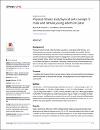| Abstract | Background
Physical inactivity is high within the Qatari population, particularly within females, and school-based environments, contributing to increased morbidity and mortality. School-based physical activity (PA) outcomes may be mediated by physical self-concept. Low physical self-concept may negatively impact PA engagement, compromising childhood and adolescent physical fitness, which may translate into adulthood. Normative physical fitness data for the Qatari population is unavailable. Stratifying normative physical fitness appears prudent, to not only allow comparisons to be made worldwide, but enable informed decisions for public health policy and future interventions in the Qatari population. |


